Have you ever wondered whether your Golden Retriever can make a good outdoor dog? What is going to happen if you leave him to spend the night and sleep in the backyard? He has his own house, so what’s the problem with it?
Contents
You may or may not believe it, but he will get cold if the temperature drops to certain levels. “Golden Retrievers were bred to thrive in harsh conditions - how can they get cold?”, you may be wondering.
This article is going to explain when Golden Retrievers can get cold; how to spot that they are cold; what health complications can occur; how to keep them warm at night. We will also talk about protective gear for your “ready-to-play-in-any-weather” retriever.
Golden Retriever Coats

Can their coats not keep them warm? Even though Golden Retrievers have two coats and they belong to a special coat group called double-coated, their coat won’t keep them warm in the winter months. Of course, it does depend on where you live and the climate in that geographical area.
Their coat consists of a top layer and a bottom layer. The top layer is a waterproof layer and the bottom layer keeps the dog warm.
Can Golden Retrievers Get Cold?
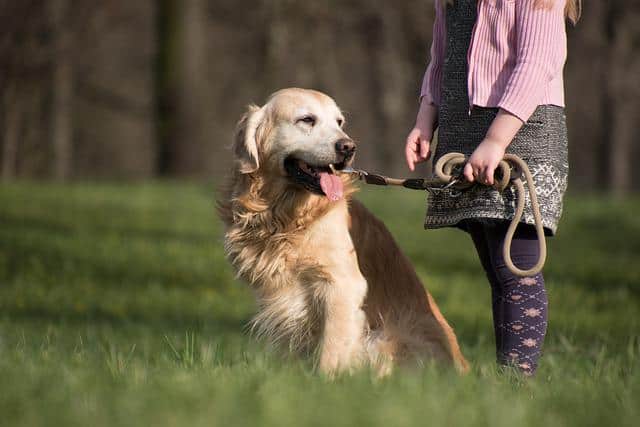
The short answer to this question is, yes. Golden Retrievers will get cold if you keep them outside at night or leave them outside for too long in the winter months when the temperature is below 20F (-6.7℃). This will hurt them and may lead to hypothermia or frostbite. Anything between 45F (7.2℃) and 90F (32.2℃) won’t hurt them.
When Does Golden Retriever Get Cold?
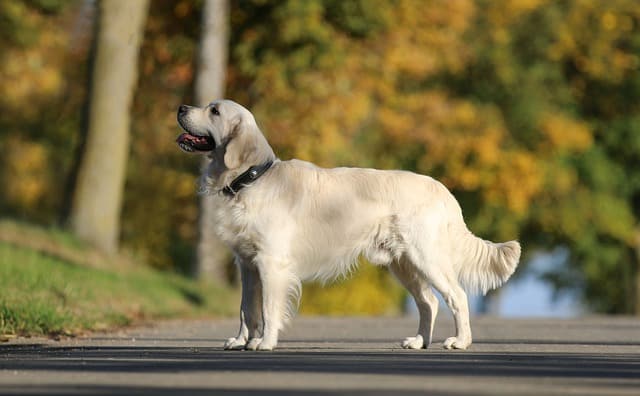
As mentioned above, Golden Retrievers will get very cold when the temperature outside drops to below 20F (-6.7℃). However, keep in mind that they start to feel the cold at 35°F (1.67°C) so don’t wait until it’s 20F (-6.7℃) to take them inside.
Ideally, they shouldn’t be left outside for long periods or overnight. Your Golden Retriever getting cold is not the one concern you may have. The other thing is that Golden Retrievers are prone to skin problems and spending too much time in unpleasant weather conditions increases the risk for or aggravates a skin condition.
If you are taking him outside in the winter months when the temperature is below 20F (-6.7℃), only go for a walk and not leave him out overnight, because he will get hurt. It is worth mentioning that if you are going to walk him in such low temperatures, he must wear protective gear such as a jacket and snow boots. We will talk more about it further in the article.
In harsher and colder conditions when there is a lot of snow, follow the 10-minute rule - let them be outside not longer than 10 minutes, even when they are wearing a jacket and protective boots.
How Do You Know Your Golden Retriever is Cold?
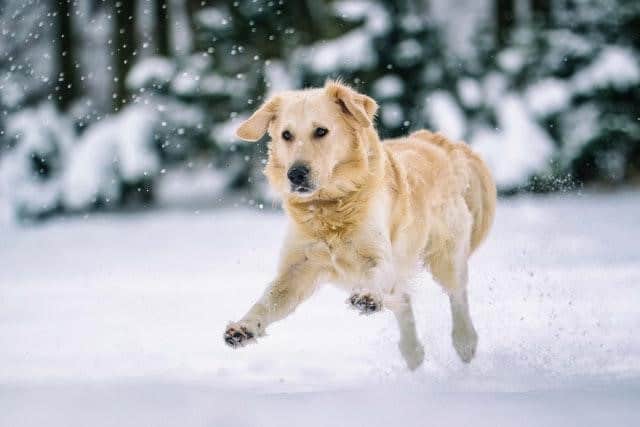
Now you know that despite the two layers of coat, Golden Retrievers can get cold. However, how do you know that they are actually feeling cold? What are the signs or symptoms?
Let’s briefly go over the symptoms of an actual cold. Please take these seriously because this is not just feeling cold and uncomfortable, this is actually being ill. If you notice those symptoms, you may want to take your dog to a vet or consult a professional if you don’t have much experience dealing with a dog's cold.
The symptoms are just like humans’:
- discharge from their nose;
- congested nose;
- laboured breathing;
- coughing;
- watery eyes;
- sneezing;
- lethargic and sleeping more;
- decreased appetite.
Here are the signs to look out for to determine whether your Golden Retriever is feeling cold. And again, the signs are pretty much like humans, therefore, they shouldn’t be that hard to spot.
- he is barking;
- whining;
- shivering and shaking;
- lifting paw off the ground and moving slowly;
- tries to hide/seeks shelter;
- tucked tail, hunched posture, and curling up;
- seems anxious and uncomfortable.
How To Determine How Cold He Is Actually Feeling?
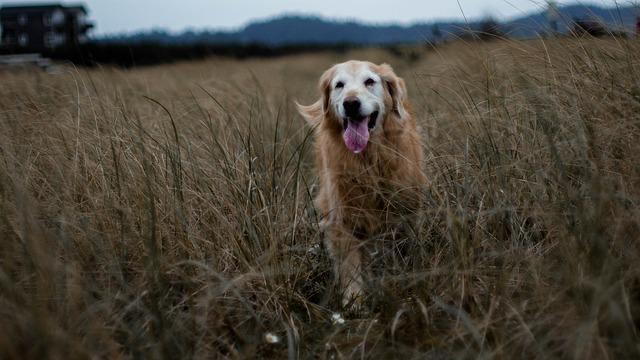
Several factors help you determine how cold your Golden Retriever is feeling:
- Weight - the heavier your Golden Retriever is, the warmer he will feel, and therefore the more time it will take for him to get cold. Is it not very healthy to carry that extra weight but in the colder nights or winter months the extra body fat will protect him from getting hypothermia or frostbite. On the other hand, a fit and lean or smaller dog is likely to feel colder than the chunky one.
- Age - both puppies and senior Golden Retrievers will feel colder than adult dogs. The reason is that puppies and seniors will struggle to regulate their body temperature. Therefore, it’s better not to leave them outside for an indefinite amount of time and make sure to keep an eye on your Retriever at their young and old age, especially.
- Humidity - on hot days, when humidity is high, there is a lot of moisture in the air which makes it harder for a dog to cool down. They cannot cool themselves because their cooling mechanism is not working. When the air is humid, perspiration will not evaporate immediately, which will keep the dog's temperature high enough to stay warm. Humid air at night will help your Retriever to stay warmer for longer without getting cold because the cooling mechanism is not working as well as it should.
- Dampness - if your Golden Retriever had a bath or a swim, don’t leave it outside until he is dry. It will be a matter of minutes when he starts to feel cold.
- General health - dogs who are sick or have just recovered from illness struggle to regulate their body temperature and keep themselves warm, as opposed to healthier and younger dogs.
- Wind and clouds - wind carries away the heat of the dog’s body and makes it harder to stay warm. Cloudy days will always feel colder than a sunny day.
Health Complications

The thick double coat of a Golden Retriever won’t always protect him from getting cold because dogs’ body temperature is higher than humans’ and what is warm for us - may be very cold for them.
When the dog’s body temperature is below 100F (37.7℃), they are at risk of health complications. Some of the most severe complications that may happen are hypothermia and frostbite. Let’s go over the signs and symptoms to look out for.
Hypothermia
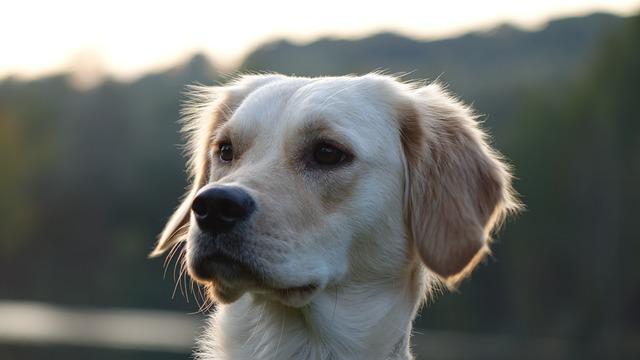
Hypothermia happens when the dog’s body temperature drops to dangerous levels. Your Golden Retriever may become hypothermic when he spends too much time outside on a cold day or night, in the winter, or when his coat is damp for too long.
Some of the most serious consequences are frostbite, heart problems, kidney failure, coma or death. However, if you notice the signs early, the condition is not life-threatening. If you are unsure what to do, take your dog to a vet for treatment.
Here are the signs of hypothermia:
- heart rate slows down;
- breathing is slower;
- shivering followed by no shivering;
- lethargic;
- cold to the touch;
- pupils dilate and eyelids and gums are pale or blue.
Frostbite

Frostbite is tissue damage that can occur when the dog is exposed to extreme cold. It is a natural process that protects vital organs. When this happens, blood gets redirected from the body’s non-vital body parts such as paws and tail to the heart, lungs, brain, etc.
It is important to note that dogs with diabetes, heart problems or conditions that affect blood flow are at higher risk for frostbite.
The frostbite signs are:
- the affected area is discoloured;
- pain to the touch and swelling;
- the affected area feels cold when touched;
- skin ulcers or blisters;
- dead skin (black in colour);
How to Keep Them Warm at Night

First of all, take your retriever inside and don’t keep him outside at night, if possible (especially in winter). However, if he does need to sleep outside, try to follow a few rules:
- Proper nutrition and lots of water (get heated dog bowl)
Focus on a proper diet, especially, in cold seasons when your Golden Retriever is not as active as in the summer. Dogs burn more calories when the temperatures are low, therefore, you can increase their calories in the winter.
- Healthy and dry coat (build him a shelter)
Look after his coat and make sure he doesn’t spend much time walking around with damp fur. When the fur is wet, it doesn’t protect dogs from the wind. Avoid shaving his fur in the cold months because a longer coat keeps them warmer.
- Insulated house
Make an insulated house for your Golden Retriever. It will keep the cold air out on winter days and your dog will be spending nights in warmth and comfort.
- A self-heated blanket, dog beds and mats;
Think about purchasing self-heated items such as a blanket, mat and a dog bed.
If you follow the simple rules and watch for the signs and symptoms of a cold in your dog, you will have a fit and happy Golden Retriever for years to come. Always remember that it is better to prevent a cold rather than treat a cold.



